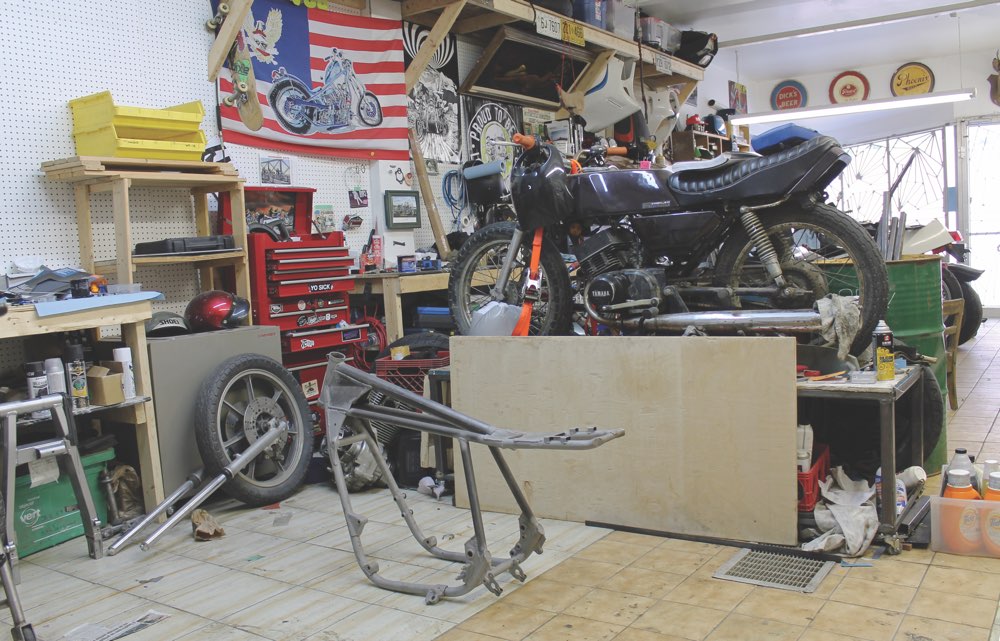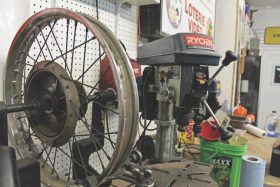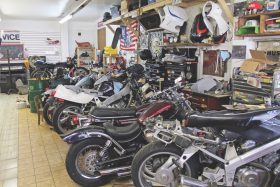Forming a reasonably priced hangout for fellow gearheads to wrench and create.
Wouldn’t it be great if you had a place to store your bike, work on it and use that same place as a social hangout for your bike-riding friends, summer or winter, all at a reasonable cost? Or, even if it weren’t your own place, it would still be quite convenient to have access to a bike lift, tools and equipment to perform your own simple maintenance or more involved repairs, possibly saving you a costly trip to the local shop. This would be especially helpful if you own an older bike in need of repairs, the cost of which might exceed the bike’s value if you were paying the full hourly rate at a professional service department.
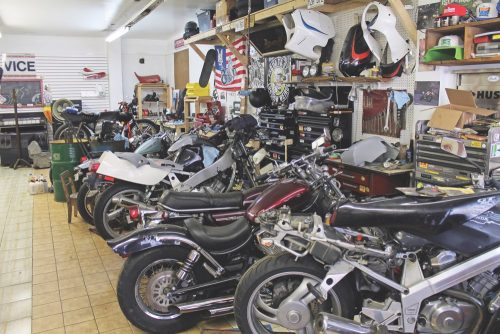 Well, you can consider getting yourself involved with a communal motorcycle shop. The idea is simple: Gather a few of your motorcycle-riding friends, rent an appropriately sized garage or other suitable space, and set up shop. By involving several people in this co-operative endeavour, you can split the rent among each other, which reduces costs for everyone. Having several “members” also helps equip the shop, as everyone can bring in some tooling or contribute toward the purchase of larger equipment, like a compressor, a welding machine, or even something as elaborate as a lathe or milling machine for those larger projects. And if you get creative, you can cut costs even further, but more on that later.
Well, you can consider getting yourself involved with a communal motorcycle shop. The idea is simple: Gather a few of your motorcycle-riding friends, rent an appropriately sized garage or other suitable space, and set up shop. By involving several people in this co-operative endeavour, you can split the rent among each other, which reduces costs for everyone. Having several “members” also helps equip the shop, as everyone can bring in some tooling or contribute toward the purchase of larger equipment, like a compressor, a welding machine, or even something as elaborate as a lathe or milling machine for those larger projects. And if you get creative, you can cut costs even further, but more on that later.
That’s what Montreal resident Paul Davenport has done with six of his buddies. When looking for a place to work on his bike five years ago, Davenport and two others started looking for a spot to rent, but in their price range they could only find a vacant ground-floor apartment, so it became their impromptu bike shop. They soon outgrew the small single-bedroom apartment and moved (their bikes) into a larger three-bedroom pad in the same building. When the landlord decided to renovate the building, they looked into getting a larger place, preferably commercially or industrially zoned. They lucked out when they found a vacant commercial space in town that used to be a skateboard shop.
Since the rental cost of the commercial space was considerably higher than the apartment’s, Davenport enlisted a few more partners and rented the place. An unexpected benefit of renting a former skateboard shop was that it was equipped with a properly ventilated paint room. Each partner has a workspace, albeit a tight one, and there are several projects on the go. Among the current projects are a Yamaha RD200 dirt tracker (you read that right) that is being put back on the road; a chopper that seems to be built on a vintage Paughco plunger frame; an electric bike that for now is just a bare Kawasaki frame; and Davenport’s own Honda NT650 Hawk.
To help further reduce rental costs, Davenport rents out a workspace with tools, through word of mouth and social media, to do-it-yourselfers working on their bikes. He even has a retired motorcycle mechanic on call to help with more involved repairs.
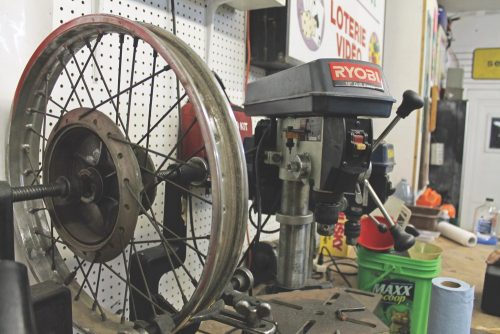 But there are a few things to consider before signing the lease. If the rental space is in a residential area, make sure you can operate a shop in the vicinity, even if it’s not for profit. Regardless of the location, be respectful of your neighbours by not firing up any motorcycles indoors, but if you do wish to do so, that you’ve installed a proper exhaust ventilation system. Keep the noise down indoors and out – you don’t want complaints to convince the landlord you shouldn’t be there and thus evict you. Also make sure you handle gasoline carefully and don’t have any leaking carburetors, gas tanks or petcocks – aside from the fire hazard, the smell will likely bother others. If oil is leaking (and it’s going to happen, considering the age of the bikes likely to inhabit the area) use pans to contain it so the floor isn’t damaged for future renters.
But there are a few things to consider before signing the lease. If the rental space is in a residential area, make sure you can operate a shop in the vicinity, even if it’s not for profit. Regardless of the location, be respectful of your neighbours by not firing up any motorcycles indoors, but if you do wish to do so, that you’ve installed a proper exhaust ventilation system. Keep the noise down indoors and out – you don’t want complaints to convince the landlord you shouldn’t be there and thus evict you. Also make sure you handle gasoline carefully and don’t have any leaking carburetors, gas tanks or petcocks – aside from the fire hazard, the smell will likely bother others. If oil is leaking (and it’s going to happen, considering the age of the bikes likely to inhabit the area) use pans to contain it so the floor isn’t damaged for future renters.
You can also transform the space into a proper hangout by installing a big-screen television or, as Davenport has done, adding a vintage jukebox. If it’s a large enough space, you can set up a kitchen, or at least plug in a fridge to keep the beer cold. And if you plan on making this spot profitable by regularly renting out workspaces, you will probably have to register it as a business.
This phenomenon is not unique to Montreal, and there are several of these community bike shops springing up across the country. If you’re thinking of starting your own, call up a few friends, pool your resources and build your ultimate moto cave.
Technical articles are written purely as reference only and your motorcycle may require different procedures. You should be mechanically inclined to carry out your own maintenance and we recommend you contact your mechanic prior to performing any type of work on your bike.









